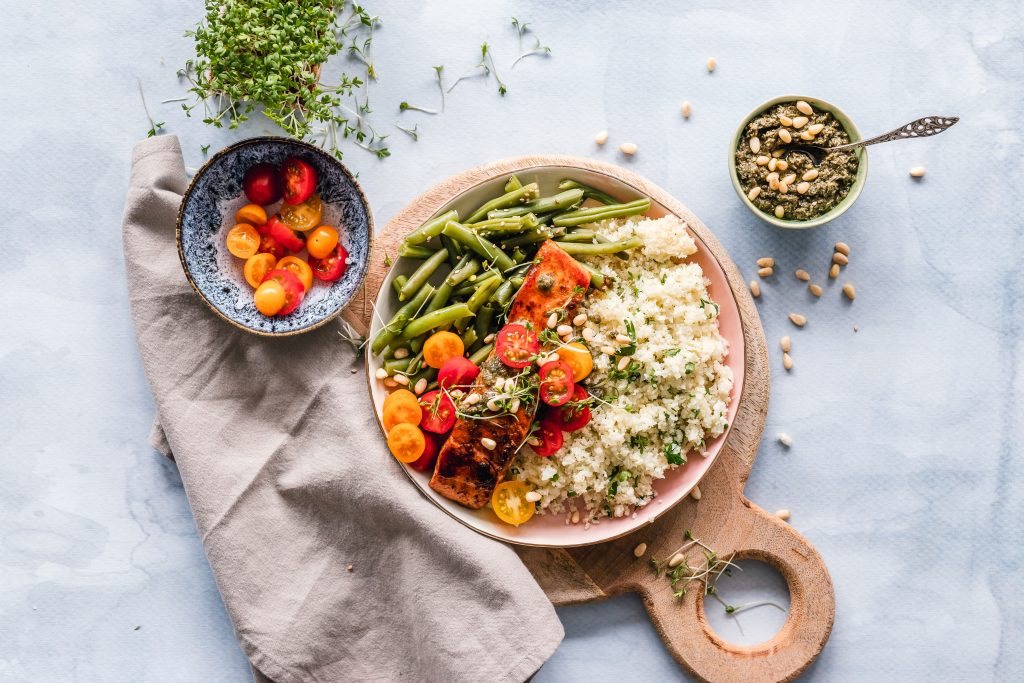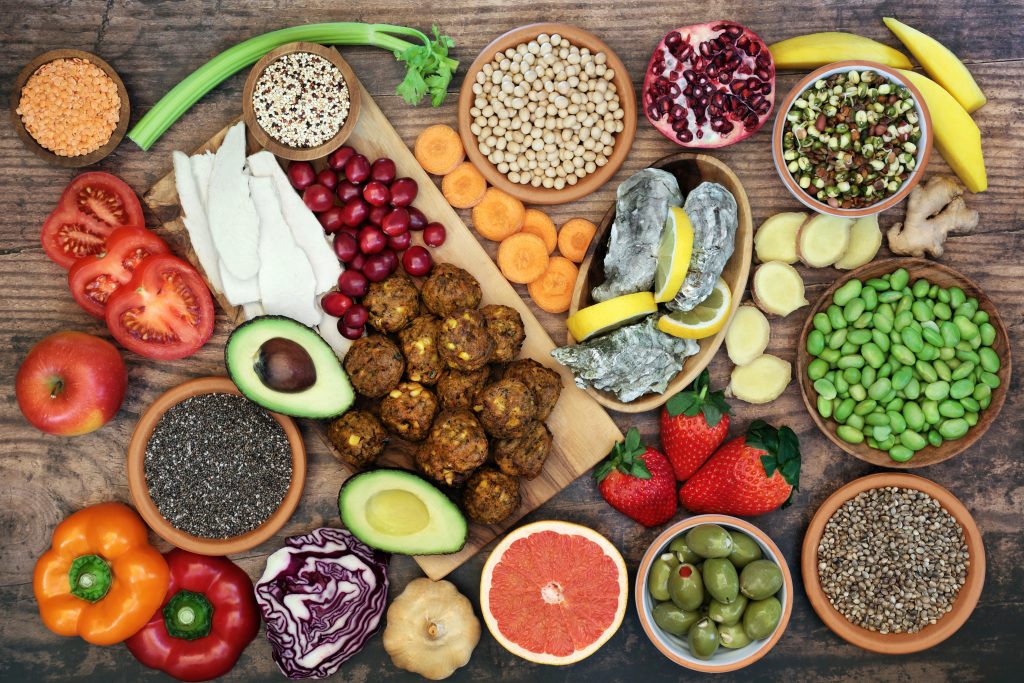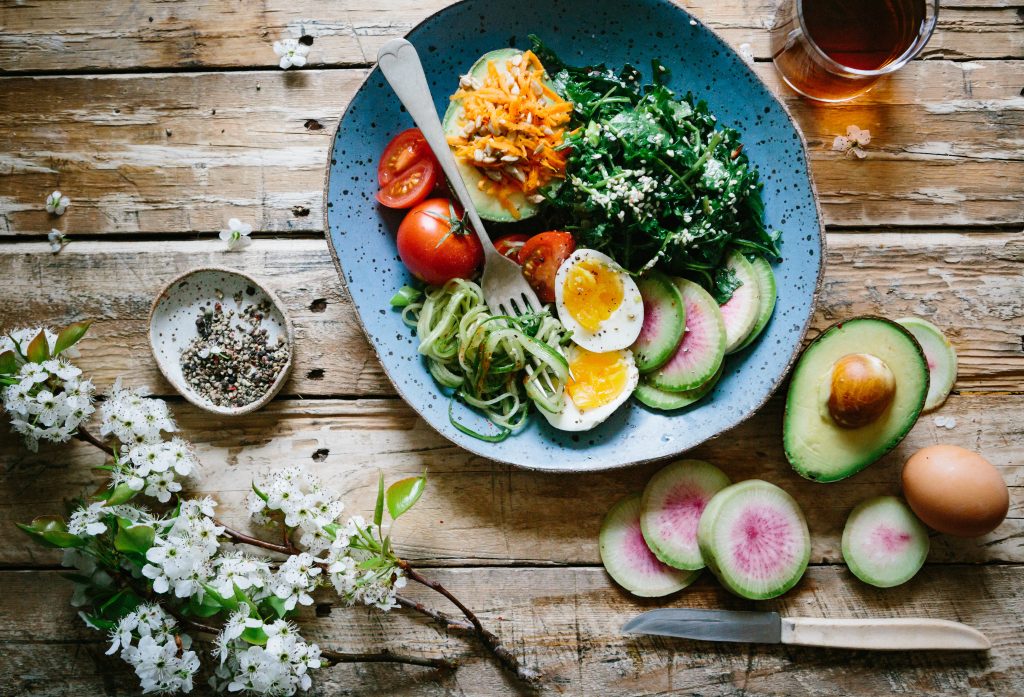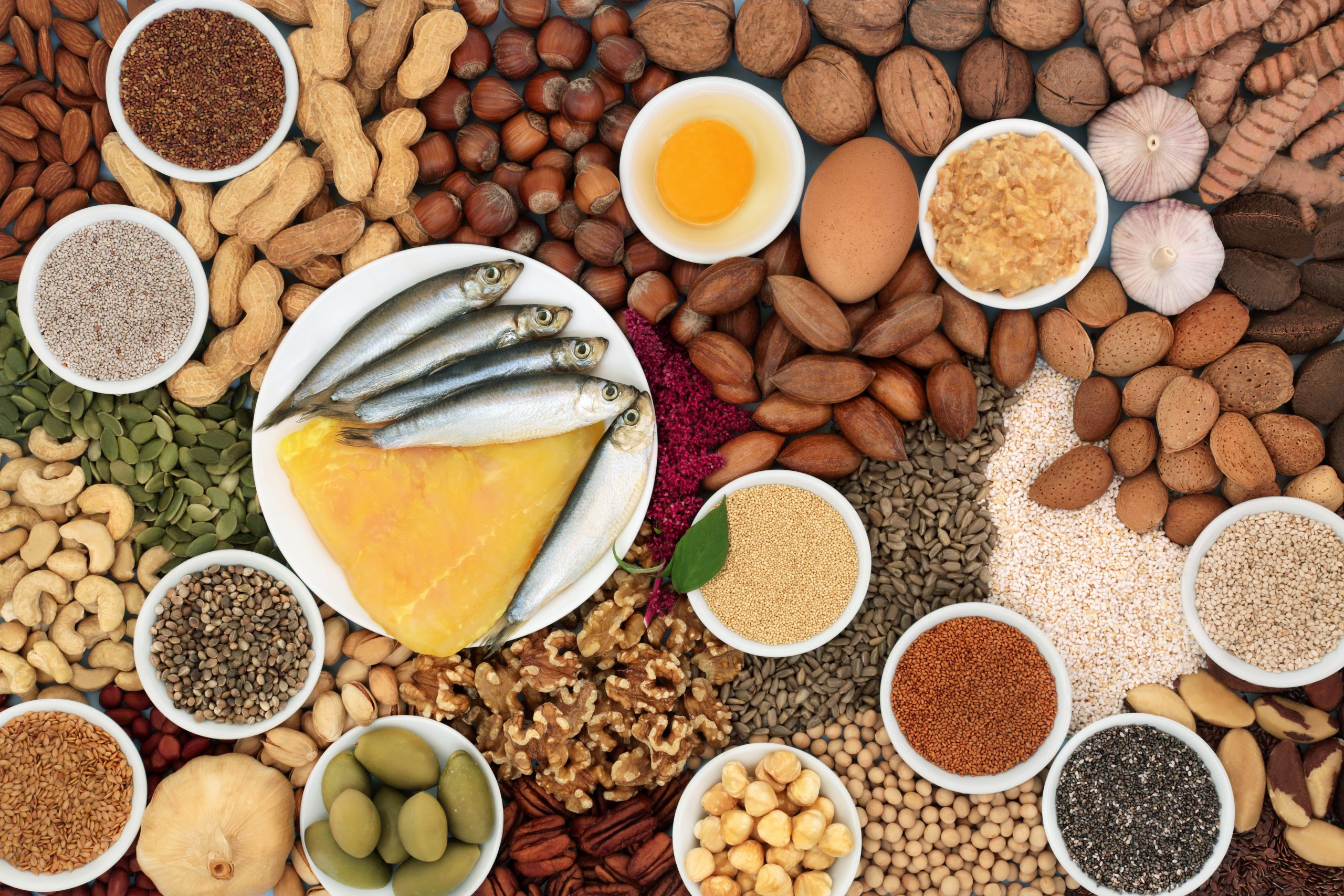Every strand of hair tells a tale—sometimes of vitality, at times of neglect. The road to lustrous, strong hair often feels riddled with unanswered questions and daunting challenges. Yet, the solution often lies not in expensive treatments but on our plates. With numerous nutrition myths and dietary advice flooding the internet, how does one discern fact from fiction? “Healthy Hair Diet 101” is your definitive guide, answering your burning queries about the nexus between diet and hair health. Embark on this enlightening journey as we dispel myths and serve you the unvarnished truth about nourishing your hair from within.
Also Check -Hair Care Handbook- Addressing 100 Common Concerns, Tips, and Remedies
53 FAQs: Answers to All Your Nutrition Queries for Healthy Hair
Faqs- Fundamentals of Hair Nutrition
1. What foods promote hair growth?
For optimal hair growth, consider foods rich in protein, vitamins, and minerals. Include fatty fish rich in Omega-3 like salmon and mackerel, and lean meats and eggs for high-quality proteins. Leafy greens like spinach provide iron, and fruits like berries are high in antioxidants and vitamins. Seeds and nuts offer essential fats and vitamin E. Embrace a balanced diet with varied nutrients to nourish hair follicles, stimulate growth, and maintain scalp health.
2. Can a balanced diet prevent hair loss?
Yes, maintaining a balanced diet can significantly contribute to preventing hair loss. Nutritional deficiencies are a major culprit for hair thinning and loss. Consuming a well-rounded diet that includes adequate protein, essential fatty acids, vitamins, and minerals can help in maintaining healthy hair and reducing hair fall. Remember, factors like stress, hormonal imbalance, and genetics also play a role, but a balanced diet is the foundational step in maintaining hair health.
3. How does protein intake affect hair health?
Protein is a building block for hair, as hair is primarily made up of keratin, a type of protein. Adequate protein intake is crucial for the growth and strength of the hair strands. It helps in the formation of new hair cells and repairs damaged ones. Including varied sources of protein like lean meats, dairy products, legumes, and seeds can enhance hair texture, reduce breakage, and support overall hair health.
4. How often should I eat Omega-3 rich foods for healthy hair?
Omega-3 fatty acids are essential fats that nourish hair, support hair thickness, and reduce scalp inflammation. Incorporate Omega-3 rich foods like fatty fish, walnuts, flaxseeds, and chia seeds into your diet 2-3 times a week. Regular intake is crucial as our body cannot produce Omega-3s, and including them in our diet can address issues like dry, brittle hair, and improve hair density.
5. Can I improve hair texture through diet?
Absolutely. A nutrient-dense diet directly impacts the texture and quality of your hair. For smoother and shinier hair, incorporate foods rich in vitamins A and E, such as carrots, avocados, and sunflower seeds, which can protect hair strands and provide natural moisture. Regular intake of protein-rich foods like eggs and lentils can strengthen hair strands, and Omega-3 rich foods can add to the hair’s luster and density.
6. Is Biotin Essential for Preventing Hair Loss?
Biotin, a water-soluble B-vitamin, is pivotal for maintaining hair health as it plays a crucial role in keratin production, a protein essential for hair structure. A deficiency can lead to hair thinning and loss. However, biotin deficiency is rare, and it’s crucial to approach biotin supplementation cautiously, as an excess is not necessarily beneficial and its efficacy in hair growth for individuals without a deficiency is debated. A balanced diet typically provides sufficient biotin for most individuals.
7. How Does Water Intake Impact Hair Health?
Adequate water intake is paramount for overall health, including the health of your hair. It aids in maintaining optimal cellular function and vitality. Dehydration can impact the ability of the hair cells to generate and maintain healthy growth, leading to brittle, dry hair that is prone to breakage. Water also helps in flushing out toxins, potentially reducing scalp irritations and dandruff. Aim for at least 8 cups of water daily to maintain hydration levels and support hair health.
8. What Foods Are High in Biotin?
While supplementation is an option, numerous foods are naturally rich in biotin. Eggs (particularly the yolk), almonds, cauliflower, cheese, mushrooms, sweet potato, and spinach are all excellent sources. Including a diverse range of these biotin-rich foods in your diet can help maintain healthy biotin levels, supporting hair health, skin health, and energy metabolism naturally.
9. Are There Any Vegetarian Sources of Omega-3 Fatty Acids?
Yes, there are several plant-based sources of Omega-3 fatty acids. Chia seeds, flaxseeds, and walnuts are potent sources of Alpha-linolenic acid (ALA), a form of Omega-3 fat. Brussel sprouts and algae oils also provide Omega-3s. While the body can convert ALA to the active forms of Omega-3 (EPA and DHA), the conversion rate is low, so it’s essential to consume ample quantities of these vegetarian sources.
10. How Does Iron Deficiency Affect Hair Health?
Iron is vital for hair health as it helps in the transportation of oxygen to the hair follicles, promoting growth. An iron deficiency, often seen in conditions like iron-deficiency anemia, can lead to insufficient oxygen supply to the hair follicles, impacting the hair growth cycle, leading to hair loss. Consuming iron-rich foods like lentils, spinach, and tofu, along with Vitamin C rich foods to enhance iron absorption, can help in maintaining optimal iron levels.
FAQs -Vitamins, Minerals, and Hair Health

11. How Can I Get Enough Protein on a Vegetarian Diet for Hair Health?
For vegetarians seeking ample protein, diversification is key. Include a variety of legumes like lentils, chickpeas, and black beans. Quinoa is a complete protein and an excellent addition. Nuts, seeds, dairy products, and eggs (if included) are potent protein sources. Incorporate a mix of these in daily meals to ensure a balanced intake of amino acids essential for hair strength and growth.
12. What is the Role of Vitamin E in Hair Health?
Vitamin E is a powerful antioxidant that aids in combating oxidative stress, which can damage hair follicles. It helps improve scalp health, reducing inflammation and promoting hair growth. Its moisturising properties can prevent dry, flaky scalp and enhance hair shine. Foods rich in Vitamin E include sunflower seeds, almonds, avocados, and spinach.
13. Can a Lack of Vitamin A Lead to Hair Problems?
While Vitamin A is crucial for cell growth, including hair, a deficiency can lead to an array of hair problems, including dry, brittle hair and an itchy, flaky scalp. However, excess Vitamin A can also lead to hair loss. Maintaining a balanced intake with foods like carrots, sweet potatoes, and kale is vital for optimal hair health.
14. How Can I Incorporate More Zinc into My Diet for Healthy Hair?
Zinc is integral for hair tissue growth and repair and helps keep the oil glands around the follicles working properly. A deficiency can lead to hair loss. To incorporate more zinc, include foods like lentils, pumpkin seeds, hemp seeds, and whole grains. Including a variety of these foods can help maintain balanced zinc levels, supporting hair health.
15. What Foods Can Cause Hair Loss?
Certain foods and dietary patterns can potentially lead to hair loss. A diet high in added sugars, saturated and trans fats, and processed foods can lead to inflammation, affecting hair health. Excessive intake of Vitamin A can also lead to hair loss. Alcohol and high levels of caffeine can disrupt hormonal balance, impacting hair growth.
16. How Much Biotin Should I Consume Daily for Healthy Hair?
The recommended daily amount of biotin varies depending on age, gender, and health conditions, but adults generally require around 30 to 100 micrograms per day. Biotin can be sourced naturally from foods such as eggs, almonds, cauliflower, and avocados. While supplements are available, it’s preferable to meet your biotin needs through a balanced diet to ensure holistic nourishment.
17. Is Too Much Vitamin A Bad for the Hair?
Absolutely, excessive Vitamin A can lead to a range of issues including hair loss. It is because excessive Vitamin A can trigger hair follicles to prematurely enter the shedding phase, leading to hair loss. Balancing intake through food sources like sweet potatoes, carrots, and kale is key, avoiding high-dose supplementation unless medically advised.
18. Can I Reverse Grey Hair with a Healthy Diet?
While a balanced, nutritious diet can prevent premature graying by addressing underlying nutritional deficiencies, reversing grey hair isn’t scientifically proven. Graying is primarily influenced by genetics and ageing, and claims of dietary reversal lack substantial evidence. However, maintaining optimal levels of vitamins and minerals supports overall hair health, potentially delaying the onset of greying.
19. How do Antioxidants in Food Help in Maintaining Hair Health?
Antioxidants in food combat oxidative stress caused by free radicals, protecting hair follicles from damage and inflammation. They support scalp health, preventing hair disorders like premature greying and alopecia. Foods rich in antioxidants, such as berries, nuts, and leafy greens, can prevent hair thinning and breakage, promoting luster and hair strength, and fostering overall follicle health.
20. What are the Vegetarian Sources of Iron for Healthy Hair?
For vegetarians seeking iron, ample options are available. Legumes like lentils and chickpeas, seeds like pumpkin seeds, and vegetables like spinach and swiss chard are excellent sources. Whole grains and fortified cereals, along with fruits like dried apricots, also contribute to iron intake. Combining these with Vitamin C-rich foods enhances iron absorption, optimising its benefits for hair health.
FAQs- Specific Nutrient Focus and Dietary Impacts
21. Can Dairy Products Improve Hair Health?
Indeed, dairy products can significantly contribute to hair health due to their rich protein and calcium content, which are vital for enhancing hair strength and growth. Items like Greek yoghourt also contain probiotics, which can aid in absorbing nutrients essential for hair health. However, it’s crucial to choose wisely; opt for low-fat, unsweetened varieties to avoid excessive caloric and sugar intake.
22. How Much Water Should I Drink for Optimal Hair Health?
Hydration is foundational to overall health, including that of your hair. Aim for at least 8 glasses or 2 litres of water daily. Adequate water intake aids in transporting vital nutrients to cells, including hair follicles, and is crucial in maintaining scalp hydration, reducing the risk of issues such as dandruff, dry and brittle hair.
23. Can Stress Affect My Hair Health Even if My Diet is Good?
Absolutely. Even with optimal nutrition, chronic stress can severely impact hair health, potentially leading to conditions like Telogen Effluvium, where hair is prematurely pushed into the shedding phase. Stress management, through mindfulness, regular exercise, adequate sleep, and relaxation techniques, is crucial in maintaining hair health, working synergistically with a balanced diet.
24. How Does Sugar Intake Affect Hair Health?
Excessive sugar intake can lead to inflammation and insulin resistance, impacting hair health adversely. It can disrupt hormonal balance, potentially leading to hair thinning and loss. A high sugar diet can also deplete essential nutrients required for hair growth. Maintaining a balanced, low-sugar diet is crucial for maintaining optimal hair and overall health.
25. What are the Best Sources of Protein for Hair Growth?
Protein is pivotal for hair growth, and its sources vary widely. For omnivores, lean meats, fish, and eggs are excellent choices. Vegetarians can opt for lentils, chickpeas, and other legumes, along with dairy products. Quinoa and soy products like tofu are also protein-rich. Including a diverse range of protein sources ensures a comprehensive intake of essential amino acids necessary for hair health.
26. Can Weight Loss Affect Hair Health?
Indeed, rapid or significant weight loss can impact hair health as it may lead to a deficiency in essential nutrients. The body might prioritise vital organs over hair follicles when distributing nutrients, leading to hair loss. A balanced, gradual approach to weight loss, ensuring adequate intake of essential nutrients, is crucial to maintain hair health during weight reduction.
27. Can Too Much Fat Intake Cause Hair Loss?
While healthy fats are crucial for hair health, excessive intake of saturated and trans fats can lead to inflammation and other health issues, potentially impacting hair health adversely. It’s essential to balance fat intake, emphasising omega-3 fatty acids found in fish, flaxseeds, and walnuts, and minimising intake of unhealthy fats found in fried and processed foods.
28. What is the Role of Minerals in Hair Health?
Minerals play multifaceted roles in maintaining hair health. Iron aids in the transportation of oxygen to hair follicles, zinc is involved in hair tissue growth and repair, and selenium helps in preventing hair loss. A deficiency in these minerals can lead to hair-related issues. Incorporating a variety of mineral-rich foods like nuts, seeds, leafy greens, and lean meats is pivotal for optimal hair health.
29. Can Diet Alone Improve Hair Health?
While diet is a fundamental component in maintaining and improving hair health, it’s not the sole factor. A holistic approach, incorporating a balanced diet along with adequate hydration, regular exercise, stress management, and proper hair care practices, is imperative for achieving optimal hair health. Each aspect synergistically contributes to the overall health and vitality of the hair.
30. How Long Does it Take to See Improvements in Hair After Changing Diet?
Typically, it may take around three to six months to observe noticeable improvements in hair health after dietary changes, owing to the hair growth cycle. However, individual variations, such as existing health conditions, age, and genetic factors, can influence the duration. Consistency in maintaining a balanced diet and healthy lifestyle is crucial during this period.
FAQs- Understanding Nutritional Nuances and Dietary Variations

31. Can Excess Vitamin Intake Cause Hair Loss?
Yes, the excessive intake of certain vitamins, notably Vitamin A, can induce hair loss by pushing hair follicles into the shedding phase prematurely. Balancing vitamin intake through a diversified diet and avoiding high-dose supplements unless prescribed is crucial to prevent such adverse effects and maintain overall health and well-being.
32. How Does Alcohol Consumption Impact Hair Health?
Alcohol consumption can have several negative impacts on hair health. It can lead to dehydration, causing dry and brittle hair. It can also deplete the body of essential nutrients by affecting the absorption of vitamins and minerals critical for hair health. Additionally, excessive alcohol intake can lead to hormonal imbalances and can disrupt sleep, indirectly affecting hair health.
33. Can Caffeine Impact Hair Growth?
Caffeine has a dual impact on hair growth. While it can potentially stimulate hair growth by blocking the effects of DHT, the hormone associated with hair thinning, excessive intake can lead to dehydration and hormonal imbalances, potentially impacting hair health negatively. Maintaining moderate consumption and balancing it with adequate water intake is key to leveraging its benefits.
34. What Foods are High in Keratin?
While keratin, a type of protein, is not directly obtained from food, consuming protein-rich foods can aid in keratin production. Foods such as eggs, poultry, fish, dairy products, and legumes are rich in the amino acids needed to produce keratin. Additionally, foods high in biotin, like almonds and sweet potatoes, can also support keratin synthesis, aiding in maintaining hair structure and strength.
35. Are Raw Eggs Good for Hair Health?
While raw eggs are rich in proteins and fats and are often used in hair masks for external application to enhance hair texture and shine, consuming them poses risks like Salmonella infection. Cooked eggs are a safer and highly effective alternative, offering biotin, protein, and other essential nutrients necessary for hair health without the associated risks of consuming them raw.
36. Can Lack of Sleep Affect Hair Health, Even with a Good Diet?
Absolutely. Lack of sleep can significantly impact hair health as it can lead to stress and imbalance in hormone levels, notably increasing cortisol, which can induce hair follicle damage and hair loss. Sufficient, quality sleep is crucial for body recovery and balancing hormone levels, vital for maintaining hair and overall health, regardless of diet quality.
37. Is Excessive Intake of Spicy Foods Bad for Hair?
Excessive intake of overly spicy foods can potentially impact hair health. Spicy foods often lead to digestive issues and can disturb the body’s balance, potentially affecting the absorption of essential nutrients necessary for hair health. Moderation is key, and balancing spicy foods with nutrient-dense options is crucial to maintain holistic well-being and hair vitality.
38. What Role Does Collagen Play in Hair Health?
Collagen is pivotal for hair health, serving as a significant component of the hair’s structure and maintaining the integrity of the hair follicle. It provides amino acids that aid in the production of keratin. Additionally, it has antioxidant properties, protecting hair follicles against damage from free radicals. Collagen supplementation or consumption of collagen-rich foods like bone broth can contribute to hair health.
39. Is a High Protein Diet Good for Hair Growth?
Yes, a diet rich in protein is beneficial for hair growth as hair is primarily composed of keratin, a type of protein. Adequate protein intake ensures the supply of essential amino acids necessary for keratin synthesis, promoting hair strength and growth. Incorporating a variety of protein sources, such as lean meats, fish, dairy, and legumes, is crucial to support hair health.
40. Can Oily Foods Lead to Hair Fall?
Consuming excessive oily and greasy foods can lead to an imbalance in the body’s internal environment, potentially leading to scalp issues like dandruff and seborrheic dermatitis, which can contribute to hair fall. Maintaining a balanced diet, rich in antioxidants, vitamins, and minerals, and low in excessive oils and fats, is crucial to prevent hair fall and promote overall hair health.
FAQs- Delving Deeper – Vitamins, Lifestyle, and Hair Health

41. How do Vitamins Impact Hair Growth?
Vitamins play a critical role in hair growth by participating in the cellular metabolism of the hair follicles. For example, B-vitamins, especially biotin, are crucial for energy production and the synthesis of fatty acids, both essential for maintaining hair health. Vitamin A helps in the production of sebum, nourishing the scalp, while Vitamin E has antioxidant properties that prevent oxidative stress and damage to the hair follicles.
42. What is the Significance of Amino Acids in Hair Health?
Amino acids are the building blocks of proteins, crucial components of hair structure. They form keratin, the primary protein in hair strands, and promote the creation of red blood cells, which deliver nutrients and oxygen to hair-producing follicles. Essential amino acids like lysine and methionine play significant roles in absorbing minerals necessary for hair growth and in strengthening the hair shaft, preventing breakage.
43. How Can I Balance My Diet for Optimal Hair Health?
Balancing your diet for hair health involves integrating a variety of nutrient-dense foods. Include lean proteins, healthy fats, and a colourful range of fruits and vegetables to ensure a supply of essential vitamins and minerals. Stay hydrated and incorporate sources of antioxidants to combat oxidative stress. Avoid excessive intake of processed, sugary, and oily foods, and prioritise foods rich in biotin, zinc, iron, and vitamins A, C, D, and E.
44. Can I Get Healthier Hair Without Supplements?
Yes, obtaining healthier hair without supplements is feasible through a well-rounded, nutritious diet. Consuming a variety of foods rich in essential nutrients, such as lean proteins, fruits, vegetables, whole grains, and healthy fats, can provide the necessary vitamins and minerals for optimal hair health, making supplementation unnecessary for those without specific dietary deficiencies.
45. What is the Connection Between Hormonal Balance and Hair Health?
Hormonal balance is intertwined with hair health, as hormones regulate the hair growth cycle. Imbalances, such as elevated levels of dihydrotestosterone (DHT), can lead to hair thinning and loss. Conditions like polycystic ovary syndrome (PCOS) can also disrupt hair health due to hormonal imbalances. Maintaining hormonal equilibrium through a balanced diet, regular exercise, stress management, and adequate sleep is crucial for optimal hair health.
46. Can Fruits Improve Hair Growth?
Certainly! Fruits are rich in antioxidants, vitamins, and minerals essential for hair growth and health. Vitamins A and C found in fruits like oranges and strawberries are crucial for sebum production and collagen synthesis, respectively, both promoting hair growth and preventing hair breakage.
47. How Does a Diet Rich in Vegetables Impact Hair Health?
A diet abundant in vegetables provides essential nutrients that promote scalp health and hair growth. Vegetables like spinach and kale are rich in iron and other minerals which are vital for the transportation of oxygen and nutrients to hair follicles, fostering hair health and growth.
48. Can I Treat Dandruff with Diet?
While diet alone might not cure dandruff, it can significantly help in management. Consuming a balanced diet rich in zinc, B vitamins, and healthy fats can help in maintaining scalp health and reducing inflammation and flakiness associated with dandruff.
49. Is Avoiding Junk Food Beneficial for Hair Growth?
Absolutely. Junk food is typically high in sugars, salts, and unhealthy fats, which can lead to scalp inflammation and hair loss. Avoiding such foods and opting for a balanced, nutritious diet can significantly improve hair health and promote hair growth.
50. How Often Should I Consume Dairy Products for Healthy Hair?
Including dairy products like milk, cheese, and yogurt in your daily diet can be beneficial due to their richness in proteins, vitamins, and minerals like calcium, which are essential for hair health. However, it is crucial to opt for moderate consumption and choose low-fat or fat-free options whenever possible to avoid excessive caloric intake.
FAQs- Special Focus: Specific Diets and Scalp Health
51. Can a Gluten-Free Diet Improve Hair Health?
A gluten-free diet can be beneficial for individuals with celiac disease or gluten sensitivity, as gluten consumption in such cases can lead to various health issues including hair loss. For those without a gluten-related condition, there’s no proven benefit of a gluten-free diet for hair health.
52. Does a Low-Carb Diet Affect Hair Health Negatively?
A low-carb diet, if not properly managed, can lead to a deficiency in essential nutrients like biotin, iron, and protein, impacting hair health negatively by causing hair thinning and loss. Balancing low-carb diets with sufficient protein, healthy fats, and nutrient-dense vegetables is crucial to avoid adverse effects on hair health.
53. What Role Does Scalp Health Play in Hair Growth and How Can Diet Help?
Scalp health is fundamental to hair growth, as healthy follicles lead to healthy hair. A well-rounded diet rich in anti-inflammatory foods, antioxidants, vitamins, and minerals can maintain scalp health by ensuring proper blood flow and nutrient delivery to the scalp, preventing infections and inflammations.
In our journey to unveil the lush, vibrant locks that mirror our internal well-being, understanding the profound interplay between our dietary choices and hair health is paramount. The pursuit of lustrous, resilient hair isn’t merely about external applications but is deeply intertwined with nourishing our bodies from within, with balanced, mindful nutrition. The pain of witnessing strands of our essence wither away can be mitigated by embracing a lifestyle harmonised with nutritional wisdom and holistic well-being. Let us embark on this journey of internal nourishment and external radiance, allowing our hair to whisper tales of our holistic vitality to the world.

Leave a Reply